- Home
- Steve Rasnic Tem
The Man on the Ceiling Page 12
The Man on the Ceiling Read online
Page 12
Then the fluid was dropping once more, the haze dissipating rapidly into nothing, and there were the elephants floating out of the tidal pool, and all at once Kate was laughing and crying. Her grandchildren stared at her in alarm, until she shouted, “Soup! It’s elephant soup!” They all laughed so hard everyone else thought them crazy, not knowing the story the great-great-grandfather had told Kate’s mother when she was a little girl, so many years ago.
25 of the 487 Rules of Storytelling
If every word were tattooed into your skin, would it be a good fit?
Read aloud what you have written. Does this sound like you speaking?
Be generous with your characters. Life’s hard enough.
Don’t drive, or write, after ingesting drugs or alcohol. Don’t drive or write when feeling too full of yourself.
Adherence to safety precautions and local ordinances is always recommended.
Don’t let anyone ever tell you you have nothing important to say.
Tell a new story every day. Find an old story and put a new twist on it.
Make stuff up, but never lie.
Is that your face in the mirror? I don’t think so.
Every family has its imaginary history. Fail to speak it and it’s lost.
Choosing your words carefully isn’t simply a recommendation. It’s a responsibility.
A story is never completely your own.
Characters, like children, all have pieces of you in them, but your control over how they turn out is largely illusory.
Writers who cannot love their own characters are poor choices for companions.
Sometimes to make sense, you must make nonsense.
Make yourself a gift of irrational conversation.
Sometimes to find the light you have to peek into the dark.
Never ignore a child’s questions. Never ignore anybody’s questions.
Sometimes you have to ignore your story to tell it truthfully.
Sometimes a sentence drawn from a hat is better than one long considered.
When in doubt, turn things upside down.
When telling tales: demand a good price from strangers, but share generously with the child who asks for one more.
Sometimes to find a story you have to lose a few words.
If you don’t know what else to say, write about not knowing what else to say.
Choose carefully the stories you tell, and, just as carefully, the ones you don’t. Both will live inside your children after you’re gone.
Chapter 8
Hitting the Quarter-Mark
Fear shies away from being directly observed. So do electrons and alien cultures, truth and reality, and whatever we mean by “the divine.”
Anticipatory by nature and definition, fear is an act of imagination, of pure creativity. We’re afraid of things that haven’t happened yet. Once they’ve happened—which is to say, taken form—it isn’t fear anymore but grief or horror or despair or maybe relief. Writing and reading about fear—which is to say, giving it form—turns it into something else. Somewhere in the space between being afraid and giving it form, something important can happen.
Everything we’re telling you here is true. That’s the best we can do.
Let’s imagine they’ve been married now for fifty years.
They have come to resemble each other, as often happens to those in profound relationship—husbands and wives, parents and children, owners and pets, prisoners and guards, teachers and students, gods and worshipers. The bones of their faces are wide, the flesh soft and softly wrinkled in patterns that go together. Their hands, separate or, most often, touching (though not often clasped anymore, because holding on too tightly hurts them both), are bent in many of the same ways, ring fingers similarly indented. Each of their bodies bears evidence of a lifetime of coming into contact with things, more like body art now than scars, and they more or less remember many of the stories behind the marks, though there’s not much call for telling them again: kitchen injuries; the hammer poorly aimed on a high roof on a summer afternoon made hallucinatory by the fumes of hot tar; the gouging oarlock on an overturning canoe; the childhood fall down cellar steps; the car accident.
They’re set in their ways, which are different from the ways in which they thought they were set a decade or five decades ago, different again from the ways still to come. Toast and grapefruit juice for breakfast, and for each a single mug of something, his mug the one with blue stripes and hers with teddy bears; on Saturdays, also a softboiled egg apiece. A walk at mid-morning and, most days, another after dinner. Every afternoon a phone call from their younger daughter, every Sunday a visit from the older, the occasional lunch with their younger son, calls from their older son usually from prison. The routines, even the ones that make them sad, calm the anxiety they each would otherwise have to handle in some other way, but do nothing to keep away Steve’s fear.
Always part of his make-up, one of the countless things that attracted Melanie to him in the first place, Steve’s fear has intensified over the years as he has become more and more himself. Sometimes Melanie thinks she can’t stand it anymore. Sometimes his terror and his bravery in the face of it, the way he loves life anyway, endear him to her anew, arouse passion to new intensity. Sometimes, she’s scared, too.
“What are you so scared of?” Melanie has fallen into the habit of asking him way too often. Hunched over in his chair, he can’t answer because the gravity of his spirit has suddenly increased, implications and consequences have come down on him, and he cannot see himself upright under the weight. “What are you seeing that I’m not?” and he cannot bring himself to tell her, about the shadow that clouds his blood, that turns and tears cells from their moorings, that spins and grows until it cleans out all nerve, all tissue, all memory, filling every place he lives until there is no place left for living, darkening the sky and flooding the ground, bringing down his terror on anyone who might stray below.
Melanie has an inkling, though. They’ve been married almost fifty years, and Steve’s fear has always been the other partner in their ménage a trois. When they were young and first in love and she’d begun to realize what a troubled child he’d been, she’d sometimes been afraid herself of trying to make a life with this man, and sometimes had wished with all her heart she could travel through time and space to tell him, “Sweet boy, don’t be scared.”
Her whisper, coming out of his blood and heartbeat and the air passing through his lungs and the stream of voices into and out of which everybody steps time and time again, would scare him, would provide further proof—as if any were needed—that there was plenty in this world and in the invisible world to be afraid of. He would dive back under the covers. She’d dive under there with him, determined to comfort him whether it was in his best interests or not.
“Don’t be scared. You’re safe. You’ll be safe with me.” That isn’t exactly a lie. It’s just not the whole truth, and he would know it. He would sing the ditty he’d made up to comfort himself, in the way that teenaged girls comfort themselves by cutting on their arms. Melanie can hardly bear to think of the child who is now her husband singing this little song, but he would sing it there under the covers to keep her at a distance he’d imagine to be safe. “Nobody loves me, nobody cares for me, I am all alone. . . .”
“You’re not all alone.”
“Am so!” He would be fierce, insisting on the view of the world he needs. “I am so alone.” Singing again: “I am all alone. . . .”
“You won’t always be,” she would promise that little boy if she could. “Someday, when you’re a grown man, you’ll have a family who will love you more than you can imagine. More even than you’ll be able to imagine then.”
Maybe the frightened and lonely little boy would take comfort in that, if she could cross time and space to tell him. Just as likely, this message from beyond would terrify him and send him farther into himself.
In any case, she’d be doing it more for herself than
for him. Because she couldn’t bear to think of his pain. Because she didn’t want him to have been so unhappy. Because she loves him more than anyone can imagine.
And Steve had turned out to be the sanest person she knew. If she had been able to change things for that little boy hiding under the covers in a room designated forever not his, if she could have sent him her message, she would have been getting in his way, interrupting. Steve hates being interrupted.
She couldn’t always help it, though. Even after all their conversations over all the years, she couldn’t always tell when he’d said what he wanted to say, and she’d start talking at the wrong time, and he’d snap, “Let me finish!”
She’d whisper over the years and the miles, “Don’t be scared. Please don’t be scared,” thereby keeping him from singing the song it was in him to sing.
So now she tries to stay with, “What is it, Steve? What’s making you so scared?” He can’t tell her about the figure in the ceiling shadows staring at him with eyes that turn over a hundred times a minute, the dark holes at their centers taking him where he desperately does not want to go. She knows, though. There’s a figure on the ceiling for her, too—not the same as Steve’s, but close enough.
“Look,” she says to him. “The bird’s still there. But you wouldn’t be able to tell it’s a bird if you didn’t already know.”
He thought she hadn’t seen the bird that had caught its foot along the edge of the roof and dangled outside the kitchen window, dying in plain view and there was nothing he could do about it. He thought she’d been protected by her own way of seeing the world, or somehow he’d protected her and their girls and their little boy dead so many years. And their youngest son, the child they would not have had if Anthony hadn’t died—how could that be? Now he sees, at the moment of Melanie’s comment—which has the air of someone appreciating a sad and beautiful work of art—how ridiculous and how disrespectful it is to think any of them wouldn’t or shouldn’t notice.
The bird has been hanging there for the better part of a year. Wind made it seem to struggle; at first, it doubtless really did struggle. Decay made it shrink and twist. Before long, decay will make it disappear.
It’s hard for Steve to tell if the man on the ceiling struggles, or if that’s an illusion brought on by the movement of air. Sometimes the man on the ceiling grows thin when nobody notices him for a while, and then he’ll be as fat as kidnapped babies, as bloated spiders in a web. He might hang there for years without moving, reduced to a ceiling stain or an inconsequential bit of decoration. But sooner or later he will come down.
“Look, Steve.”
But Steve isn’t about to look. He knows what he’ll see. The man on the ceiling is gathering himself together to fill the sky. He is a flock. He is a multitude. He stretches his arms sideways like the wings of a bomber. He drops one by one from the ceiling until the roar of him drowns out all other sound. He multiplies daily, a little bit of death hiding in every gesture. He is the snarling dog at the end of the alley, the loose board in the stairs, the fever that will not break, the accident waiting to happen. He hangs there, waiting, ready to drop down when we least expect it, or when we most expect it, our expectations or lack thereof being of no consequence to him. He is the horror that rises from the underworld and descends from the heavens. He is the shadow that falls with each step through the world, the bitter taste after each breath. He is part and parcel.
Steve can get lost in the seductive poetry of being afraid. Melanie is determined not to let him, although she does despair. When she hears him mutter, probably not even to her, “Something is about to happen. Something is about to change,” she loses patience.
“Oh, for heaven’s sake!” she snaps at him.”Something is always about to happen. That’s life, Steve. We’re always on the cusp of change. Everything that happens to us changes our lives.”
He doesn’t hear it. He doesn’t want to hear it. He knows she’s right, everything changes, something is always about to happen, but he doesn’t have to like it. Change, he has gotten into the habit of declaring, sucks. He’s not always aware of it. He’s not always this afraid. When he’s not afraid, something might sneak up on him. Can’t have that.
For a long time, the first intimation of disaster (and there were plenty) would send Steve out for a drive. Partly this was for the very reason that he fully expected to die in a car from a confluence of fate and inattention. The point was not to get anywhere, either geographically or with regard to whatever problem was preoccupying him. He just drove and worried, for their own sake.
One night in college he’d been driving and worrying about a girl. It was very dark, very late, very quiet. He wasn’t getting anywhere. Suddenly the car pulsed with calamitous noise and brilliance, and he looked up to see the front-end of a locomotive filling the passenger window. He stomped the gas pedal and sped a block or so until he could catch his breath. Then he continued his driving ruminations, no more alert to real danger than before, having added the locomotive to his box of boogeybears, disasters, and spooks.
A couple of years later it was another woman who fueled his automotive meditations as he drove from town to town along Colorado’s Front Range. He was falling in love, and it felt, among other things, like impending disaster. This time he let speed get away from him, and when he finally looked up it was a cement truck filling the windshield. A jerk of the steering wheel rocked the car off two wheels as he sailed into the next lane. At that precise time and place, the lane was clear. “Shit,” he remarked aloud, and kept on driving, speed not much reduced, on his way to see the woman who would become his wife.
When they told him his son was dead, he got in his car and drove. The spring evening was clear, the interstate into the mountains nearly empty. He flew. He did not drive off a cliff, although there were invitations. Only much later did he realize that Melanie and their daughter had had to take a taxi home from the hospital. They never said anything to him about it.
We tell each other fearful stories. Not to banish or deny or even calm the fear, but to give it form, to call it out and make its acquaintance. Sharp edges wait for us in the darkness, attached to hands, which are in turn attached to murderers, rapists, dark hitchhikers, faceless beasts whose shambling is like a parody of our own cautious movements. We spend much of our lives avoiding shadowed places, bad neighborhoods, colorful cities and open spaces and depths and heights. For we know how sharp edges can tear, leaving scars that never perfectly heal. In our food, exotic insects have laid their eggs, tiny and protectively colored to blend in with our macaroni, peas, and fruit slices. Ingesting them sometimes makes us immediately and violently ill, our guts twisting and turning inside out. Worse is when the eggs lie dormant for decades, finally hatching when our stamina is at its lowest ebb. Someone has switched our baby, someone lives in our attic crawl space, someone has stolen our grandmother’s corpse and now drinks tea and watches television with our grandmother dressed in clothing that would have embarrassed her. An alligator lives in our sewer line. A murderer waits for us in that shaded lane. In the sky beyond those mountains, aliens are gathering like flies around a corpse.
He has memories, but he thinks they might be memories of dreams, and he can’t decide if that would make them more or less true. Catapulted from deep sleep by the unearthly howl of sirens that he was simply unable to believe could be mechanically generated, he imagined people kept out of sight there in his home town whose only purpose was to be periodically trotted out to give these warnings with mouths trained by years of insanity. The warning itself was unmistakable: a tornado was coming, and given the number of voices that had been gathered together, Steve knew it must be of great size. The ambient light had taken on a decidedly sinister yellow-gray patina. The air pressure had changed, and he had trouble breathing. The sky had thickened and darkened. Something was moving in. Something was about to happen. Something was about to change.
No matter what their initial form—tropical hurricane, Midwest-sty
le tornado, tiny dust devil suddenly appearing at the end of the driveway— the storms would always grow and warp rapidly, turning sideways and filling the town in the valley below Steve’s house: this great revolving wind, this mandala of torment, this depthless eye of some unknowable deity. Steve was afraid of God, who knew of all secret sins (of which there were many, including things Steve strongly suspected were sins but didn’t know for sure—like seeing what couldn’t be there, and imagining what was rude to imagine), which could easily be confused with Santa Claus knowing “if you’ve been bad or good so be good for goodness sake.”
Again and again, he found a car with a key in the ignition or whose ignition would accept one of the keys in his pocket.
Again and again, as disaster loomed, he drove. Once he’d discovered Yeats’s “The Second Coming,” he’d incant its lines from behind the wheel in an Orson Welles-like voice: Turning and turning and falcon and true anarchy. He thinks now that he barely comprehended the words, but they thrilled him and filled him with dread. Things fall apart; the centre cannot hold. More likely, the center would hold forever and suck him in.
The wind would intensify, or fall into an eerie calm. Sometimes it rained. Steve drove. At some point the circle of wind always turned like a hoop snake and tore the ground and the dead flew into the air. Steve drove, whispering and howling Yeats’s or his own somber words. If he ever stopped, some other disaster would follow: fire, agitated by these winds, would sweep in from the west like a riot of red and orange spirits, malforming the trees and breaking the backs of the houses. Or water an oily blend of amber and blue would seep up out of the ground, dissolving all the familiar places as great, handlike waves reached up to yank him from behind the wheel.

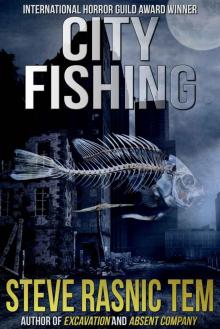 City Fishing
City Fishing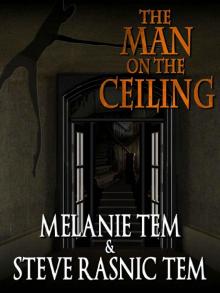 The Man on the Ceiling
The Man on the Ceiling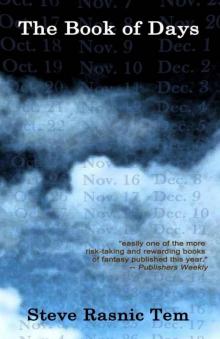 The Book of Days
The Book of Days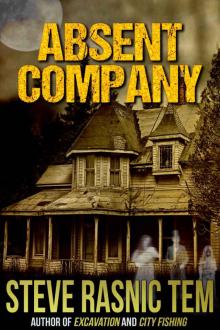 Absent Company
Absent Company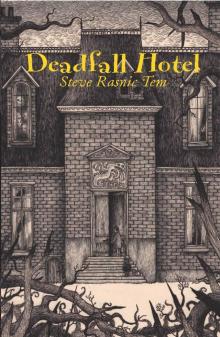 Deadfall Hotel
Deadfall Hotel Celestial Inventories
Celestial Inventories Ugly Behavior
Ugly Behavior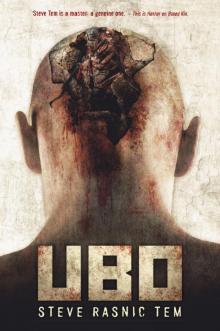 Ubo
Ubo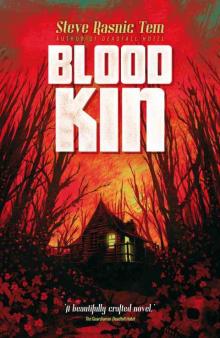 Blood Kin
Blood Kin